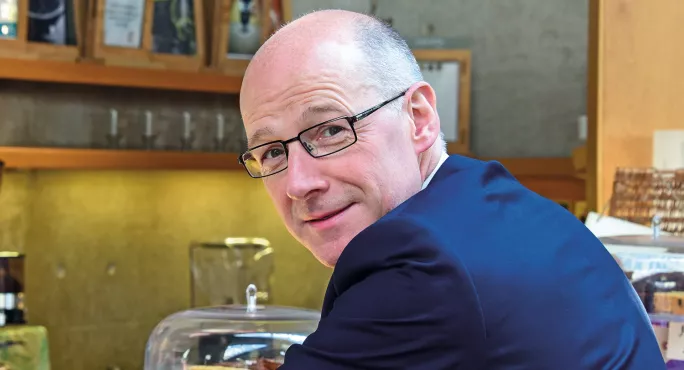- Home
- John Swinney: ‘We can succeed in closing the attainment gap’
John Swinney: ‘We can succeed in closing the attainment gap’

The start of the new school term is a natural time to think about the year ahead. There are new classes to get to know, different topics to teach and, in some cases, you will say the same thing in a different way - something that, as a politician, I am no stranger to.
I was delighted to accept the offer from Tes Scotland to provide a regular update on my work. I want to hear directly from teachers and practitioners across the country, and, equally important, I want to make sure that you know what I am doing as education secretary to help you deliver for our young people.
Since becoming education secretary over two years ago, I have been to schools all over Scotland, met hundreds of teachers, heads and classroom assistants, and spoken with thousands of pupils. Every meeting gives me new perspectives to reflect on, but I am never surprised by the passion and commitment of teachers to improve the lives of all learners.
And that, in a nutshell, is the defining mission of the government - to improve the education and life chances of our children and young people. Every child growing up in Scotland, regardless of their background, should have an equal chance to succeed. The poverty-related attainment gap that so disproportionately affects young people’s outcomes results in a gross waste of young people’s potential and talent - it has to end.
Education, training and work are the best routes out of the cycle of poverty, and we must do everything possible to close that gap. Teachers tell me that they cannot do this in isolation. I agree. Attainment is never just the product of what happens in classrooms, and fighting the effects of entrenched, inter-generational poverty is no small task.
However, some commentators say that it is simply impossible to make anything other than a dent in the attainment gap. I strongly disagree. We have to do everything possible and I believe we can succeed in that effort.
Firstly, look at the interventions we are making across government. Introducing a baby box to give every child an equal start in life. A new universal health visiting service to give families better access to health visitors. It’s why we are investing in a near doubling of free childcare that will ultimately save families around £2,500 per child a year. Giving parents more tools to help their children learn, like the Play, Talk, Read campaign, or free books and learning sessions. The range of work to improve children’s health or reduce youth offending. All of this aids learning.
Secondly, look at what we have already achieved. The Scottish Qualifications Authority results for 2018 show that Higher passes are stable, despite a continuing fall in the number of young people on the school roll, while the number of Advanced Highers being taken continues to grow.
In the first year in which unit assessments have been removed from the National 5, the overall pass rate remains high at 77.4 per cent. Awards of skills-based qualifications, meanwhile, are double the number in 2012.
And that is backed by a robust, credible assessment system.
The latest data (for 2017) shows that the proportion of pupils from our most deprived communities getting National 4s, National 5s and Highers is rising faster than in our richest communities. An increasing proportion of looked-after children is leaving school with at least one Higher or equivalent.
And there are a record number of students from Scotland’s most disadvantaged areas going to university in 2018 - a third consecutive annual rise. We want students from the 20 per cent most deprived communities to represent 20 per cent of acceptances to university. Real progress is being made and on results day we hit a new record of almost 15 per cent.
The Scottish Attainment Challenge, too, is already delivering great results, backed by the £750 million Attainment Scotland Fund over the lifetime of this Parliament.
These early signs are encouraging.
And of course, within that, I have seen for myself the difference that £120 million of Pupil Equity funding is making, with empowered headteachers driving local, tailored innovations that are benefiting young people.
So now is the time to press on further. At the start of the school term, I want to congratulate everyone within the world of education on the fantastic work that is already taking place - and look forward to even more progress in the months ahead.
Have a great year.
John Swinney is Scotland’s education secretary and deputy first minister. Want to get in touch with him? Email DFMCSE@gov.scot
Register with Tes and you can read two free articles every month plus you'll have access to our range of award-winning newsletters.
Keep reading with our special offer!
You’ve reached your limit of free articles this month.
- Unlimited access to all Tes magazine content
- Save your favourite articles and gift them to your colleagues
- Exclusive subscriber-only stories
- Over 200,000 archived articles
- Unlimited access to all Tes magazine content
- Save your favourite articles and gift them to your colleagues
- Exclusive subscriber-only stories
- Over 200,000 archived articles



